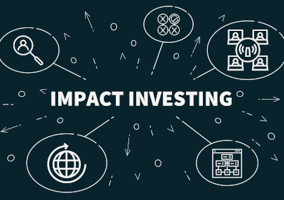Last year was like no other and as 2021 continues in a similar vein, there is time to reflect on what this means for sustainable investment moving forward.
“We have always been proactive when it comes to environment, social and governance (ESG) factors,” says Ian Chesham, director of the charities team at Barclays Private Bank. “We have continually encouraged charities to consider how they are investing responsibly, to set out a robust investment policy, and to openly declare what they are doing. But 2020 was really the year when non-financial elements came to the fore.”
The initial danger as the pandemic struck was that there would be a knee-jerk reaction from finance directors at charities scrambling to make up for lost income through higher returns on investments and putting ESG considerations on the back-burner. Chesham says this was not the case. “What we saw, understandably, was a focus on cash-flow, the availability of liquid funds and lending capabilities. At Barclays we have the ability to lend against investment portfolios, enabling our clients to remain invested in their sustainable portfolio, while at the same time providing them with greater liquidity. Consequently, we didn’t see a slowdown in the interest and uptake of sustainable strategies for fear of reduced returns.”
In fact, Chesham says that last year finally debunked the myth of lower returns on responsible investments. “We saw sustainable strategies, on average, outperform their traditional peers. If you look at the Barclays sustainable strategy, for example, we delivered over 20% returns last year, which is comfortably and significantly ahead of traditional peers.”
Long-term impact
Chesham says that the crisis shone a spotlight on companies’ resilience as investment prospects. “The ones that have good health and safety protocols, that have treated their employees well and acted quickly, are the ones that have succeeded through this crisis.”
This is likely to continue to be the case as the effects of the pandemic are long-term, says Chesham. This presents new and different opportunities. “I think we’ve made a fundamental shift in the way we work and that will impact how we measure success and the ESG credentials of companies,” says the veteran wealth manager of 17 years. “Those that haven’t been able to rapidly adapt to circumstances such as home-working and employee wellbeing are going to struggle longer term. And I can’t see things going back to the way they were. I think we’ll carry on pushing forward. Those organisations that have taken advantage of innovations in digitisation, for example, have thrived.”
Chesham points out that a focus on responsible investment was becoming more prominent even before the pandemic. “ESG conversations have been moving up the agenda for a number of years and 2020 saw the largest-ever issuance of social bonds. In 2021, we will see the first-ever UK green gilt issuance. Financial institutions such as Barclays and others have now got product suites with green and sustainable solutions firmly embedded. So the new possibilities are fantastic.”
This potential can help propel vital change to the way companies operate. “If you think about the trillions of dollars that you need to change the world to be more sustainable, that can only ever come from governments and financial institutions lending money. This presents a great opportunity long-term. It’s about driving change and financially incentivising change, not only because it’s the right thing to do, but also because it offers commercial value.”
The role of charities
Charities’ role in this transformation is evolving along with the investment landscape. “Charities are always going to have an affinity with certain areas of ESG or particular UN Sustainable Development Goals,” says Chesham. “But the evolving landscape within the financial system means that you can implement those more easily and there are more options. You can be far more targeted now than you used to be. So there is a greater opportunity for charity trustees to really hone in on what they want to achieve with their investments.”
When it comes to mainstream liquid investments, Chesham says charities have a lot more power and flexibility than even a few years ago. “There’s plenty of choice out there and I would say returns aren’t diminished. Typically, a charity will hold a multi-asset class portfolio that does everything for them. What is exciting is that you can have that portfolio with the majority of it achieving those returns but you can be particularly targeted in certain areas, to widen your reach and your impact.
“By investing sustainably and looking for positive impact you can see the huge social benefit or lasting change that you have implemented through your investments.”
What we do
Barclays Private Bank offers specialist investment advice and portfolio management to charities and not-for-profits. Our nationwide team of experienced and dedicated sector specialists work with you to understand your requirements and create bespoke solutions that help meet your financial objectives in line with your organisations’ values. Our services include: discretionary portfolio management, including ethical, sustainable and impact investment strategies, with direct access to your portfolio manager; treasury and short-term cash management; liability-matching investment strategies; credit facilities, including Securities Backed Lending; and exclusive access to private asset opportunities (private equity, private debt and infrastructure).
Fast facts*
- Over 60 years’ experience working with charities across the UK
- Barclays Private Bank has in excess of £2bn charity assets under management
- Over 1/5 of the largest 5,000 charities in the UK bank with Barclays *Figures correct as at 31 December 2020
Ian Chesham is director, charities team at Barclays Private Bank
Related articles
Ian Chesham: Sustainable investing for charities
Ian Chesham from Barclays Private Bank assures trustees they can be confident in making the decision to invest sustainably.
Ian Chesham: 2020 – The year of the sustainable investor
Ian Chesham from Barclays Private Bank looks at what the pandemic tells us about sustainable investment strategies
Ian Chesham: 'Impact investing is a very different animal from responsible investing'
Investing has evolved beyond traditional ethically screened portfolios, offering charities opportunities to make positive change.












